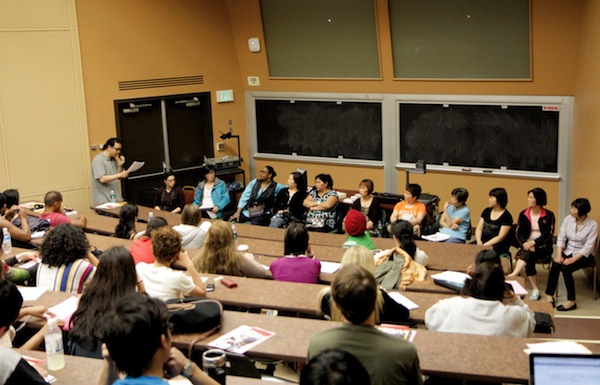
On Monday night, the Latin American and Caribbean Area Studies program (LACAS) hosted an event titled “Latina and Asian Immigrant Women Workers v. Corporations.”
The event, which took place at 6 p.m. in Lecture Hall 9, was sponsored by the Latin American Student Union, Asian Student Union and Asian Outlook, a campus magazine, with additional support from the Binghamton University sociology and Asian and Asian American studies departments.
The event featured factory workers and organizers from the “Ain’t I a Woman?!” campaign, a national outreach and educational effort led by female workers.
About 70 students attended to learn how to support female immigrant workers, students and others who are launching a national boycott headed by the AIW Campaign against Reynolds Group, an international investment company. Their demands include the right to take bathroom breaks, sick days and parental leave, the right to speak out and organize without retaliation, reinstatement with back pay for those laid off or fired and the right to a 40-hour work week with no mandatory overtime.
During the discussion, the women workers spoke about the conditions in which they worked, the treatment they received when they began to organize and what they are doing now to support those in a similar position.
Lili Cisneros, a factory worker, said she and others were exploited at Pactiv Corporation, a food packaging company acquired by Reynolds Group along with other companies.
“We couldn’t go to the bathroom, we had to work six days and did not have sick days,” Cisneros said. “When someone got hurt on the job, the managers wouldn’t call the ambulance.”
Xue Zhen Lin, a Pactiv Corporation factory worker, said the conditions worsened after a new boss was hired.
“Conditions started to get really bad,” Lin said. “[We] began to come together to solve issues in factories. The boss made promises, but there were no changes. We all wrote a letter together to ask the boss to change the working conditions in the factories. When we wrote the letter collectively, the boss got really scared.”
Cisneros said she and fellow workers struggled to reach an effective solution.
“We united,” Cisneros said. “We were able to come together, Asian and Latino, and talk about our problems. We hope for the support from all you guys. What is happening to us now may happen to others. So for this reason, we want to change the working conditions and improve them.”
Ai Jin Shi, another Pactiv worker, said they joined the campaign to eliminate mandatory overtime, change factory conditions and fight for worker’s rights.
“We are not here today to ask for your sympathy,” Shi said. “We ask [you] to join a fight for workers’ rights. We want to change conditions because as women we have to work and take care of kids. [We] want to change conditions as women and for other women as well.”
The event included a four-minute video with interviews with Pactiv workers, a discussion panel and a question-and-answer period for students.
Jessica Lucas, president of LASU and a junior majoring in English, asked the panel, “How has your experience working here impacted your views of America? Does it make you want to go back home?”
Lin said that they were very disappointed.
“We had delusions about America,” Lin said. “We thought the U.S. was very beautiful.”
Yolanda Donato, another factory worker, agreed and added that these issues are not just affecting immigrants.
“It’s not just affecting people who come from other countries, but also people born in this country,” Donato said. “Many people think this affects only undocumented workers, but it really affects everyone. We have this opportunity now to encourage workers to look ahead.”


